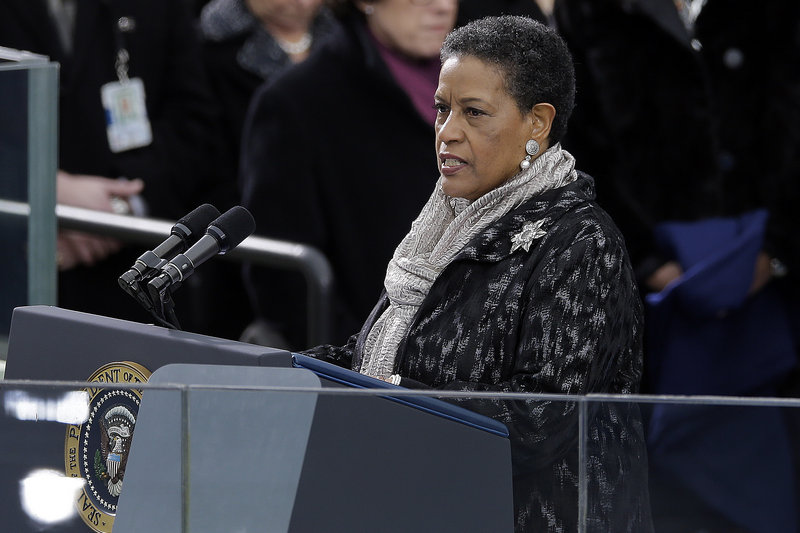Myrlie Evers-Williams, in the invocation for the inauguration of President Obama, prayed, “There is something within me. There is something within America …”
I know some of what is within Myrlie Evers-Williams. It is tragedy and it is courage, it is love and it is faith in the God of Love who in ways visible and invisible guides her life.
I met her in Claremont, Calif., when she was Myrlie Evers, recently widowed as the consequence of the assassination of her husband, Medgar. She moved out of Mississippi in search of sanctuary from the hate and violence that pulled the trigger and sent the bullet through her husband’s skull. That sanctuary was found in Claremont and in the church where I was an assistant pastor, the Claremont Church, UCC.
She told us this story, which I tell you now because it is a story that moved her to the podium — one of the many stories from those days that must not be forgotten.
The story highlights the spirit which I see, though not unopposed, as strong and motivating in the America that elected, for yet another four-year term, Barack Obama to be the president of all the states and all the people of our country.
Medgar Evers was an American soldier who returned to his home in Mississippi after World War II. He began his marriage and family supported by his success as an insurance agent. His boss and mentor in the office in which he worked preached community service.
Medgar followed that guidance and was soon a respected leader in his community and became the president of one of the few chapters of the NAACP in Mississippi. In the early 1960s, from that position, he led the efforts to register black citizens to vote.
The Ku Klux Klan, a powerful force in the South at that time, resented, opposed and intimidated all efforts that threatened segregation and empowered African-Americans.
The police, elected officials and judiciary of Mississippi marched to the Klan’s music. So much so that the bunker the Klan built in the woods across from Medgar, Myrlie and their three children’s home, regularly manned by a sniper, was never challenged by the law or lawmen of the state.
Shots were fired from that bunker into the Evers’ home often enough to force Myrlie to keep her family and its activities in rooms away from the front of the house. There were no public authorities to appeal to for protection.
A driveway led from the street to the side of the house. After a day’s work Medgar would drive home, quickly turn into the driveway and as fast as possible scramble from his car into the side door of their home.
All of this on top of all of the subtle and not so subtle disregard and disrespect the family and all of their fellow citizens of color coped with daily.
The strain all people of color felt in those days coupled with the stress of caring for the safety and well-being of her children and husband weighed on Myrlie Evers like leaden burdens of evil’s design.
One day, as Myrlie told the story, Medgar came home to find her beside herself with fury. In so many words she cried out, “Medgar, I don’t know how long I can take it. I hate those people.”
She began to sob. Medgar held her, she said, comforting her with these unforgettable words: “Myrlie, I know. I know. But we must not let them make us hate them. They are not the enemy. Hate is the enemy.”
A few weeks later in June of 1963, as Medgar got out of his car, a sniper’s bullet found its mark and Medgar lay dead on the doorstep of their side door. His death was intended to be a lesson of violence and intimidation for his wife and children and all people of color in Mississippi, a lesson of the power of hate.
Myrlie had to get her children to safety. She left Mississippi without her husband but with a commitment which was now hers, to find love sufficient in each day to overcome anger’s temptation to hate.
Medgar Evers’ bravery, faith in love and dedication to non-violence defined his martyrdom. His soaring example overcame the intimidation of the many courageous others who took his place. Fifty years later, Barack Obama was inaugurated for a second term as president of the United States.
Myrlie Evers-Williams, remarried now, her children grown and blessed by the family’s legacy, gave the opening prayer of the inauguration. She invoked the spirit of martyrs of the civil rights movement within the cloud of witnesses that surrounded the podium and our nation.
In their names and to their honor she blessed us all with her words and the story incarnate in her powerful grace-filled presence: Hate is the enemy. Love is our hope and will prevail.
Bill Gregory, an author and retired minister, can be contacted at:
Gregor1@maine.rr.com
Send questions/comments to the editors.



Success. Please wait for the page to reload. If the page does not reload within 5 seconds, please refresh the page.
Enter your email and password to access comments.
Hi, to comment on stories you must . This profile is in addition to your subscription and website login.
Already have a commenting profile? .
Invalid username/password.
Please check your email to confirm and complete your registration.
Only subscribers are eligible to post comments. Please subscribe or login first for digital access. Here’s why.
Use the form below to reset your password. When you've submitted your account email, we will send an email with a reset code.